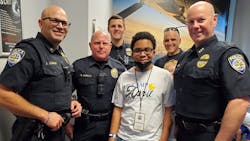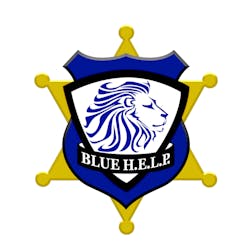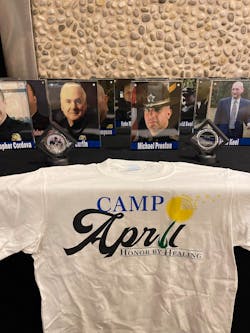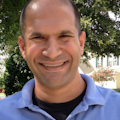When an officer dies in the line of duty, family members, co-workers and friends are left behind to deal with the aftermath. The same is true after an officer commits suicide, but the emotional trauma experienced by survivors is amplified. Feelings of guilt and even embarrassment accompany the grief and oftentimes survivors feel lost and without anyone to talk to.
Karen Solomon, who co-founded Blue H.E.L.P. along with Jeffrey McGill, says that they didn’t originally set out to create the organization that helps support the families of officers who have died by suicide that has now grown to include the fire service, EMS and dispatch in an all-encompassing group known as First H.E.L.P. Solomon, the wife of an active Worcester, Massachusetts, police officer, co-wrote a book with Jeff McGill titled “The Price They Pay” in 2015 that highlighted stories of officers who had gone through critical incidents and the cumulative trauma they’ve sustained and how it affected them.
This article appeared in the July issue of OFFICER Magazine. Click Here to view the digital edition. Click Here to subscribe to OFFICER Magazine.
While writing the book, Solomon found out that a lot of officers were taking their own lives and that a lot of them didn’t know where to get help. She and McGill decided to create the website Blue H.E.L.P. to track suicides year-over-year to serve as a sort of national database, as well as provide a listed of resources. Once they started collecting data on suicides, the surviving families would share their stories and the struggles they faced. That’s when Blue H.E.L.P. began to support the families similar to what is done for families following line of duty deaths.Supporting families
What Concerns for Police Survivors (COPS) does for line of duty deaths, Blue H.E.L.P. does for suicides. They offer college scholarships for children who lost a parent who was an officer to suicide, annual retreats where all expenses are paid, an annual honor dinner where officers who have been lost to suicide are honored with their families, and private support groups for families.
“They lose their benefits, and they get no life insurance,” says Solomon of the families. “They don’t get support; they don’t get a death payout. Many of them don’t get that pension, so it’s a really complicated situation and they end up with nothing. Everything that we do for these families is no cost. We don’t expect anything from them. We would never ask the families that because we know what their situation is like after a suicide. What’s really important to us, other than helping save lives, is this piece of joy that we’re able to give them and this connection we’re able to give them with other families is so important because it’s something they’ve never had.”Picking up the pieces
On June 29, 2018, the world changed for ShaRonda Young Calderon when her husband, Dallas County, Texas Sheriff’s Deputy Homero “Omar” Calderon, took his own life. That is the day she lost her husband, and her three sons lost their father, but she says their story really began in 2016. “That’s when he really started changing,” says ShaRonda, who also had worked for the department. He was seen by multiple doctors that year. He was first diagnosed with Bipolar II disorder and then with major depressive disorder. His last diagnosis of PTSD made sense of everything for the couple, but she says that for Omar, in his mind it was a death sentence. “He felt that his career was over and his life was over because all of he had ever known or seen was that you die from it because you lose everything,” she says. “Because he didn’t have anyone else telling him differently.”
In October of 2017, Omar attempted to take his life. Members of the sheriff’s department found him and after just a few days after leaving the hospital, he was asked to return to duty. She said that Omar started doing better, but the struggle was still there. In March of 2018, she says he started spiraling again and she knew that it was dire. That night he came home and she heard him in the garage, but he didn’t come into the house. “I knew something was wrong so I went into the garage and I saw his gear on the ground—he would never put his gear on the ground, there is always a place for everything—I saw that his service weapon was missing.” She was trying to call him on his phone when one of her sons came into the garage with his phone. On the phone, Omar had left a sticky note with instructions including where the car title was in the house, and how much money was in their son Omarrion’s college fund. “I knew then that this was it,” she says.
After the search went on for him for more than a day, there was a knock on her door Friday morning. It was the police. They told ShaRonda that they found Omar in the parking lot of the shriff’s department and that he had shot himself. “Life stopped,” she says. “That’s the moment life stopped for me.”
She was told that he wouldn’t receive full honors, which she understood, but there were honors that he would receive because he was an employee with the department for over 18 years. She later received a call from one of the unions and was told Omar would not be receiving any honors and that employees were told not to wear their uniforms to the funeral. “I remember making it to the funeral and seeing so many of them their in their uniform,” she says. “That was worth more to me than the honor he was supposed to receive because they went against orders to do it and seeing them meant so much.”
She says that afterwards, it was a struggle. A couple days after the funeral, her 11-year-old son Omarion came into her bedroom and told her he had found a way that he could hug his dad again. “There was so much fear in me because it was like he had an epiphany, he was happy,” she says. “He said ‘But I don’t want to tell you.’ I said, ‘Well, tell me.’ He said, ‘If I kill myself.’ ”
ShaRonda says she was afraid and called the family doctor to get an appointment and was told me that their health insurance policy had been cancelled. “They canceled his insurance on a Saturday,” she says. A local organization stepped in and she was able to get him therapy.Beginning to heal
ShaRonda was introduced to Blue H.E.L.P. in 2019 and was told that they were honoring officers in Washington, D.C., and would have an honor dinner during Police Week in May. “I didn’t want to attend because I was still broken, but I went,” she says. “It was beautiful. It was because what they had there, it was almost like a funeral for me.
It was a way I could get a little bit of peace because I had so much trauma around my own service for my husband.”
She said that attending the event gave her some closure because that was the first time Omar had actually been honored and that it wasn’t because of the way that he died, he was honored as an officer. “From that moment I was connected,” she says.
She was asked to attend a speaking engagement in Colorado. She went and has been a part of the Blue H.E.L.P. family ever since. “I remember the first time I spoke and I was describing Omar,” she says. “I remember an officer who was crying outside of the room (afterwards). He pulled me to the side and said, ‘I’m going to get the help that I didn’t know I needed.’ That meant the world to me and I still get choked up about that, because my husband didn’t know what he was going through. I feel like if he had someone to say what they were going through, that maybe that would have made a difference in his life. I feel like if he had more people talking about trauma and post-traumatic stress and resiliency, because it’s not a death sentence, you can live with it.”
ShaRonda found her purpose and has since become a program director for Blue H.E.L.P. “I’m able to be there for those other officers and their families,” she says. “Unfortunately, when this happens, because it’s going to happen again, that those families member have someone there who can help guide them along the journey because it’s a hard journey, but when you have someone there that can tell you ‘You’re going to feel this way, and it’s OK to feel this way,’ you’re saving lives, because suicide is passed on.” She added that all three of her son’s battled suicidal thoughts and that six months after her husband died, she attempted to take her own life.
“I understand now how it works. It has forced me to step out of my comfort zone and educate myself more,” she says. “I went back to school to finish up my master’s so I can be the most effective to help the families and officers.” She had previously earned her bachelor’s degree in Criminal Justice from Dallas Baptist University and is currently pursuing her master’s degree in psychology.
Making progress
For ShaRonda, Blue H.E.L.P. offered something she wasn’t able to find anywhere else. “When my husband died and I was told I needed to find a support group, so I went to a grief group,” she says. “I didn’t fit in because he died by suicide, so I found a suicide grief group and I didn’t fit in because he’s a police officer. I felt like ‘Where do I fit in.’ Now we have a grief group for first responders because it’s different.”
From dealing with surviving families, she has seen that their stories in a way mirror hers. “Maybe not as bad, but the stories are very similar as far as getting the help,” she says. “A lot of the officers were struggling. Some of them asked for help and they weren’t given it. It’s because they don’t have the resources, they don’t know what to do. In the aftermath, most of the families have been turned away. One of the hardest things for the survivors is that they want a connection to their department, but most of the time they do turn away.”
Over the past two years, however, she has seen a change. “I’ve seen a change in how some of the departments in the aftermath where they are trying to honor the officers. They are giving them an honor guard; they are being supportive. That’s the happiest thing when I see it and I hear ‘We got that, we received honors, we’re receiving help.’ Some of them have kept their insurance. Things are happening, so the tide is changing. I think it’s because we’re talking about it more.”
Rowlett, Texas Police Sgt. Guy Helms died by suicide in November of 2021. He was given honors by the department at his funeral. “I was overwhelmed. I was joyful because I know those families, they had a chance because they weren’t made to feel bad,” she says. “They didn’t have to feel shame and the department was there and they showed him and his family honor.”
As program director, she has played a big role in creating events for the organization and says that the retreats, camps and gatherings held for surviving families by Blue H.E.L.P. have played a big role in the healing process. “It has helped the families a lot,” she says. “It’s almost my baby.”
During COVID, an online support group was created to keep the families connected. That morphed into retreats. Camp April was created for surviving children and this past year they got the families together for a dinner. When she told her son Omarrion about the camp, he didn’t want to go to one at first after going to traditional support groups and feeling out of place, but soon discovered that Camp April was different. “This was the one time he knew that everyone in there had a loss just like his,” she says.
For more info on Blue H.E.L.P., visit: BlueHELP.org
This article appeared in the July issue of OFFICER Magazine.
About the Author
Paul Peluso
Editor
Paul Peluso is the Managing Editor of OFFICER Magazine and has been with the Officer Media Group since 2006. He began as an Associate Editor, writing and editing content for Officer.com. Previously, Paul worked as a reporter for several newspapers in the suburbs of Baltimore, MD.





